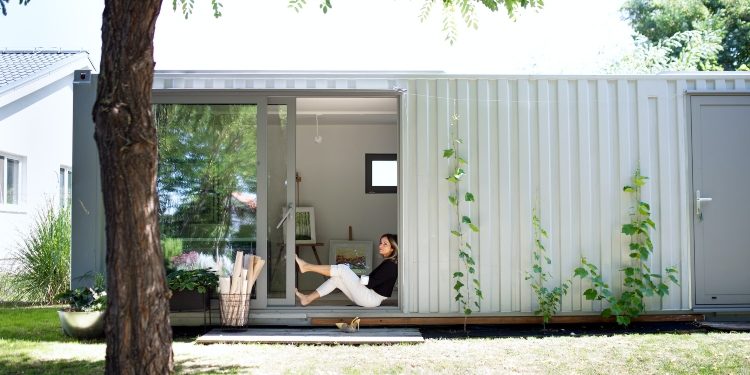The shifting dynamics of the workplace have seen many individuals in Britain adopting remote work. But the temporary solution of using the kitchen table is losing its charm, and a growing number of people are seeking dedicated home office solutions.
For those fortunate enough to have a spacious garden, constructing or converting a garden office could be a brilliant solution. These garden workspaces can be more than just a 9-5 retreat; they might also become a creative studio or hobby room, all while enveloped in the tranquillity of your outdoor space.
Ensuring Adequate Insulation in Your Garden Office
A pivotal aspect of a functional garden office is proper insulation. Although it may appear complicated, with the correct supplies and some basic knowledge, insulating your garden office on your own is possible. Here, we’ll examine the various stages and material options available.
Why Should You Insulate Your Garden Office?
Insulation in a garden office brings multiple advantages. It maintains a cosy temperature throughout the year, ensuring a suitable workspace in any weather. Beyond temperature control, quality insulation safeguards contents from dampness, condensation, and mould by absorbing atmospheric moisture. Plus, thicker walls, ceilings, and cladding add robustness to the structure, enhancing security.
Selecting the Ideal Insulation for Your Garden Office
Various types of insulation are available, each tailored to different needs and preferences. Here’s a look at some options:
Mineral Wool Rolls or Slabs
Mineral wool, available in rolls or insulation slabs https://insulationwholesale.co.uk/insulation/insulation-slab , is a prominent insulating material, offering excellent thermal and sound-absorbing properties. This type of insulation is perfect for garden offices in louder surroundings, allowing for undisturbed focus. Mineral wool is also fire-resistant, a desirable feature for spaces filled with electronic gadgets.
PIR Insulation Boards
These durable and convenient boards provide high performance. Their adaptable design permits easy on-site cutting with essential tools, and their impressive thermal efficiency and economical pricing make them a viable option, especially for various spaces within one project.
Sheep’s Wool Insulation
As an environment-friendly substitute to artificial substances, this blend of sheep’s wool and recycled plastic offers remarkable insulation. It actively absorbs moisture and contaminants, enhancing indoor air quality. Its air-trapping capability endows this natural insulation with superior thermal and acoustic properties.
Multifoil Insulation
Constructed from numerous radiant foil layers, multifoil insulation is highly effective. It’s light and straightforward to handle and can be combined with other insulating materials for maximum efficiency. When used in tandem, multifoil also acts as a vapour barrier, countering excess atmospheric moisture.
The Process of Insulating Your Garden Office
Your chosen material and the garden office’s size and structure will determine the particular insulation method. Generally, though, advances in insulation technology have simplified the process.
Start by revealing the interiors of the walls, roof, and floor. You may also install a breathable membrane to combat moisture infiltration, especially in wooden constructions.
Insulation is typically positioned in the gaps between the structural frames, along the walls, under the roof, and within the floor area. You may have to elevate the floor to insert insulation if there’s no room beneath the floor (e.g. if the office is above a concrete base). While beneficial, this step can be complex without professional guidance and may reduce the internal space.
Conclusion
Creating an insulated garden office is a practical step and a fulfilling DIY project. Following these guidelines, you can ensure your garden office stays comfortable, functional, and secure all year long, providing you with a dedicated space to work, create, or simply enjoy your garden’s serenity. Whether you are driven by performance, cost, or environmental considerations, various insulation materials are available to suit your unique needs.
David Prior
David Prior is the editor of Today News, responsible for the overall editorial strategy. He is an NCTJ-qualified journalist with over 20 years’ experience, and is also editor of the award-winning hyperlocal news title Altrincham Today. His LinkedIn profile is here.




![7 Best POS Software in the UK [2026 Edition]](https://todaynews.co.uk/wp-content/uploads/2026/02/7-Best-POS-Software-in-the-UK-2026-Edition-360x180.png)








































































